Book contents
- Frontmatter
- Contents
- List of Figures, Text Boxes, and Photos
- List of Tables
- Contributors
- Acknowledgments
- Introduction
- 1 Presidential Elections
- 2 Cracking the “Highest, Hardest Glass Ceiling”
- 3 Voter Participation and Turnout
- 4 Voting Choices
- 5 Latinas and Electoral Politics
- 6 African-American Women and Electoral Politics
- 7 Congressional Elections
- 8 Political Parties and Women's Organizations
- 9 Advertising, Websites, and Media Coverage
- 10 Women's Election to Office in the Fifty States
- Index
- References
5 - Latinas and Electoral Politics
Expanding Participation and Power in State and National Elections
Published online by Cambridge University Press: 05 June 2014
- Frontmatter
- Contents
- List of Figures, Text Boxes, and Photos
- List of Tables
- Contributors
- Acknowledgments
- Introduction
- 1 Presidential Elections
- 2 Cracking the “Highest, Hardest Glass Ceiling”
- 3 Voter Participation and Turnout
- 4 Voting Choices
- 5 Latinas and Electoral Politics
- 6 African-American Women and Electoral Politics
- 7 Congressional Elections
- 8 Political Parties and Women's Organizations
- 9 Advertising, Websites, and Media Coverage
- 10 Women's Election to Office in the Fifty States
- Index
- References
Summary
INTRODUCTION
Latina and Latino political participation in the 2012 election reached new heights, proving to be a significant factor in the electoral outcomes of several battleground states and ultimately the reelection of President Obama. Both Latinas and Latinos played pivotal roles in the 2012 election, increasing their share of the national electorate and their support for President Obama over 2008 election levels. In the end, President Obama received 71 percent of the Latina/o vote (compared with 27 percent for Mitt Romney), surpassing all previous presidential candidates with the exception of Bill Clinton, who garnered 72 percent of the Latina/o vote in 1996. In fact, among key demographic groups comprising the “new electorate” – African Americans, Latinas/os, women, younger voters, and independents – Latinas/os were the only group whose level of turnout and support for Obama substantially surpassed those of the 2008 presidential election. Table 5.1 compares voting in 2008 and 2012 across several demographic groups and demonstrates the growth of Latina/o support for Obama. Ultimately, while President Obama's favorability ratings were affected by a bruising first term, resulting in decreased support among key constituents and whites generally, Latina/o turnout and support for Obama, particularly in Florida, Colorado, New Mexico, and Nevada, were vitally important in overcoming setbacks elsewhere. As one political scientist and pollster put it, “for the first time in U.S. history, [the] Latino vote can plausibly claim to be nationally decisive.”
- Type
- Chapter
- Information
- Gender and ElectionsShaping the Future of American Politics, pp. 146 - 166Publisher: Cambridge University PressPrint publication year: 2013



